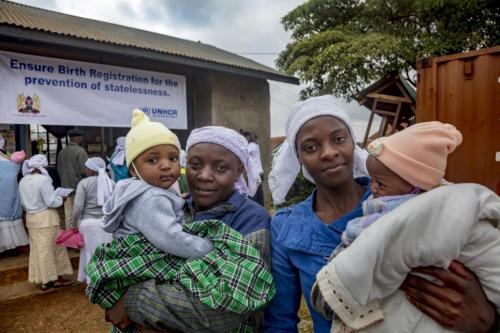Watershed moment as countries step forward to tackle global statelessness
In a historic moment in the global fight against statelessness, more than 85 governments, civil society and international and regional organizations have this week pledged hundreds of new commitments to end statelessness, a major cause of human rights deprivations for millions of people worldwide.

Two stateless Shona sisters wait to register for citizenship certificates at the District Commissioner’s office in Kinoo on the outskirts of Nairobi, Kenya, June 2019.
More than 300 pledges were received at a meeting in Geneva hosted by UNHCR, the UN Refugee Agency. The meeting, known as the High-Level Segment on Statelessness, was part of UNHCR’s annual gathering of its governing Executive Committee.
The sheer number of pledges is unprecedented for a single occasion. Among them over 220 were commitments by more than 55 states to accede to or ratify the UN statelessness conventions, facilitate naturalization of stateless people, prevent statelessness by ending gender discrimination in nationality laws, ensure universal birth registration, provide protection to stateless people and enhance or initiate data collection on stateless populations.
“We are reaching a critical mass in the global effort to stamp out statelessness. This week has shown that there is an unprecedented level of political will and commitment to resolve this issue and prevent it from arising in the first place,” said UN High Commissioner for Refugees Filippo Grandi.
“It is crucial that these commitments are now turned into action. We will be stepping up our own efforts to help States work towards the goal of eradicating statelessness completely – a goal that is within our reach, as long as this momentum is sustained.”
UNHCR convened the High Level Segment on Statelessness during the midway mark of its ten year #IBelong campaign, which was launched in 2014 to eradicate statelessness by 2024.
During the Segment, more than 20 pledges were made by States specifically to accede to or ratify one or both of the UN statelessness conventions, the 1954 Convention relating to the Status of Stateless Persons, and the 1961 Convention on the Reduction of Statelessness. This would see the 1954 Convention pass the symbolically important threshold of 100 state parties, representing more than half of all UN Member States.
On last Monday, Angola and Colombia became the two latest countries to join the Conventions, formally lodging instruments of accession and ratification to the treaties during the event itself.
Other countries committed to reform nationality laws that prevent women from passing citizenship to their children. This week, UNHCR welcomed the Islamic Republic of Iran’s amendment to a nationality law which allows children born to Iranian women and non-Iranian fathers a path towards acquisition of Iranian nationality.
Among other commitments, over 35 pledges related to stepped-up efforts to ensure universal birth registration, more than 30 pledges concerned the establishment of procedures to identify statelessness persons so as to provide them with protection and facilitate their naturalization and over 15 pledges represented commitments by States to introduce safeguards in their nationality laws to prevent childhood statelessness.
Globally, there are at least 3.9 million known stateless people but the true global figure is estimated to be significantly higher, and not least as statistics on statelessness are reported for only a third of states globally. In an effort to better identify and assist stateless people, more than 25 states pledged to take steps to improve data on statelessness, including in some countries through national censuses.
Statelessness blights the lives of millions of people globally, depriving them of legal rights or basic services and leaving them politically and economically marginalized, discriminated against and particularly vulnerable to exploitation and abuse.
Source: United Nations High Commissioner for Refugees
- 218 reads
Human Rights
Ringing FOWPAL’s Peace Bell for the World:Nobel Peace Prize Laureates’ Visions and Actions

Protecting the World’s Cultural Diversity for a Sustainable Future

The Peace Bell Resonates at the 27th Eurasian Economic Summit

Declaration of World Day of the Power of Hope Endorsed by People in 158 Nations

Puppet Show I International Friendship Day 2020

